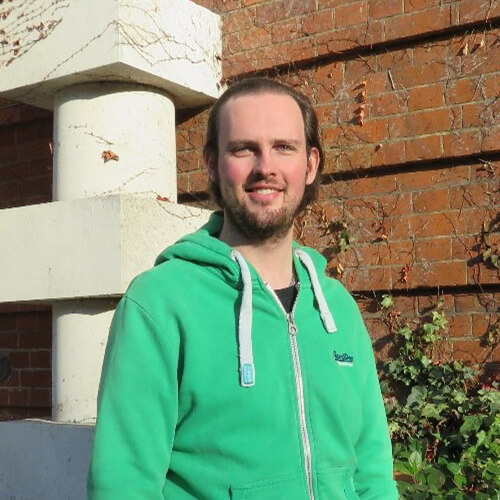
“Throughout history there have been movements to bring about change. The work I’m doing is bringing about the next big change – a barrier-free world.”
Bradley has spent years innovating new ways to break down barriers facing disabled people, as well as supporting disabled students as a Biology undergraduate at the University of Greenwich.
Most recently, Barrier-Free World, the social enterprise he created to improve accessibility for disabled people, has won awards amounting to £4,500. At the SJL National Start-Up Business Awards, he was named as the UK's best eco-friendly inventor. Meanwhile, a new system he has developed – and is using himself to complete his own PhD at his university – may mean more disabled students will be able to access PhDs in the future.
Making life easier
“In the development process, you look at what else is out there. You look at how to make a product cheaper. You look at what can make life easier.”
Bradley was motivated to do more to improve accessibility for disabled people when he noticed equipment already on the market was expensive and “targeted at an older demographic.”
“A lot of products were out there but weren’t hitting what people needed, so I redesigned them.”
After an extensive research and development phase, he began using a 3D printer to bring to life his designs. These include a dyslexic reading ruler, which is cheaper than other products on the market and offers “more colours and better functionality.” It was this product that won the social category of Enterprise Challenge 2021. “A small tool, but it means so much more – it can allow someone to access higher education, for example.” Enterprise Challenge is the University of Greenwich’s yearly competition designed to help Greenwich students and recent graduates develop their business ideas, regardless of which course they are studying.
Bradley’s most recent product is a “universal tool holder” that can be used to hold cutlery, pens and more. It connects to the hand so it cannot be dropped. “I can allow people to be independent and reduce pain.”
Involved from the beginning
“I have been involved with STAART from the beginning.”
His passion for helping others began when he worked as a Senior Student STAART Ambassador whilst completing his degree.
The initiative supports prospective and current disabled students, including those with specific learning difficulties; long-term health conditions; and/or mental health difficulties. As a STAART ambassador, Bradley provided guidance and information to prospective students with various disabilities, specific learning difficulties and/or mental health conditions. His work allowed four students to start their degree with confidence.
He is still involved with STAART alongside his studies today.
He finds the university itself a supportive place to be. Bradley explains, “we care about our students. I can speak to my lecturers. We have STAART. We have friendliness.” He points out that Vice-Chancellor Professor Jane Harrington is also a “big advocate” for inclusion.
Own barriers
“It’s hard balancing my business and my studies. Things are more challenging.”
Bradley has had his own barriers to overcome. He had to give up his ambition of becoming an airline pilot when he had a stroke at the age of sixteen, which left him with a left side weakness.
Inspired by the health staff who led his recovery, he decided to study Biology at Greenwich, a university close to home for him. With the support of his lecturers and STAART, he completed his degree with a First-Class honours.
His intention was to go on to study a PhD, but when he was told by someone in his industry that he would not be able to do this due to being a disabled student, he was worried that, once again, he would have to rethink his plans.
But Bradley is an innovator.
He found the right supervisor – Professor Joshua Boateng – who encouraged him. “He said, ‘let’s do it. Let’s do a PhD.’”
After that, it was just a matter of creating a more accessible way to study. Under the system Bradley designed, he will complete his PhD in four years instead of three, with one day studying from home in the week and one day off. “It’s still full-time, but not as strenuous.”
In December 2019, he was officially a PhD student at Greenwich, studying wound healing and the effects of natural products.
Bradley’s PhD system is making a positive impact on three other STAART graduates and he hopes, once funding obstacles have been tackled, it will allow other disabled students to complete PhDs in the future also.
Why?
“I love research, I love science, I love understanding the world, and I love making opportunities for other people.”
Bradley never loses sight of why he does everything he does. He believes a barrier-free world is possible, and that disabled people can and should access higher education without fears or boundaries.
“Things are hard. They’re never going to be easy. But the work that I’m doing, work that I am doing in parallel with Dr Melanie Thorley and programmes such as STAART, is all to make the world more accessible.”


